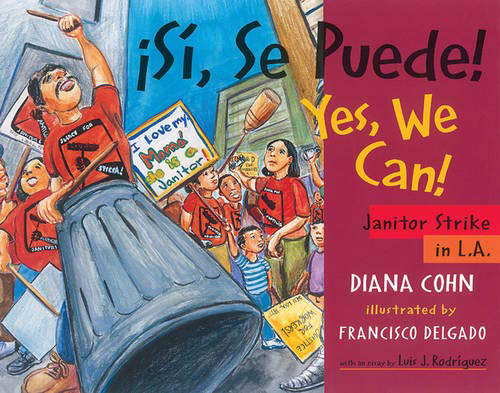Today's Lesson: Socioeconomic Status in America
Socioeconomic status (SES) is measured by several factors, but most often it focuses on income, occupation, and education, and it can have either a positive or negative impact on a person's life in the ways it affects access to resources crucial to an individual’s upward mobility. Research has also found the lower the SES, the more likely someone is to have physiological and psychological health issues. While these conversations can be complex—and often we don’t know where to begin—we believe beginning with our littlest ones can have the most long-term impact, both individually and as a society. We hope you will find the resources below helpful.
Click to return to the main page.
Learning Levels
Early Childhood Adolescent AdultRead
¡Si, Se Puede! /Yes, We Can!

This story is from the perspective of a young boy whose mother is a janitor who works at night, and he never sees her. Then she says she will lead the Los Angeles janitors’ strike. ¡Si, Se Puede! /Yes, We Can!: Janitor Strike in L.A. by Diana Cohn helps families talk about socioeconomic status and the idea that just because you work very hard doesn’t mean you are financially wealthy or secure.
EXTRA CREDIT: Bursting with colorful, digital illustrations, Maddi’ Fridge by Lois Brandt addresses the issues of poverty and childhood hunger through the relationship of two best friends, one – who only has milk in her fridge, and the other – who’s fridge is stocked with options.
Watch
My Dad, The Garbage Man
In this episode of the PBS KIDS hit Arthur, Francine learns to have pride in her dad’s job as a sanitation worker. Part of the episodes explore economic differences among friends as Muffy comes to stay with Francine, and they learn how different their homes are, but that it’s okay.
EXTRA CREDIT: In this clip from PBS KIDS’ Sesame Street, Lily—the shows first character to deal with homelessness—explains that her family was experiencing food insecurity (they didn't have enough to eat) and needed to come stay with friends on Sesame Street for a while.
Listen
Our First Talk About Poverty
In this story time read along, The Read-Aloud Teacher shares one of her picks from her book basket, On Our Street: Our First Talk About Poverty by Dr. Jillian Roberts and Jaime Casap. This book explores the realities of people living with inadequate resources and addresses mental illness, homelessness, and refugee status using age-appropriate language. You can follow along above or listen to the book on Audible.
